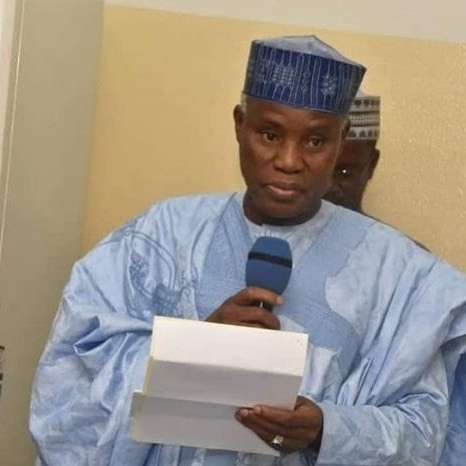While it is no longer news that president Muhammadu Buhari’s cabinet is largely made up of people with fraud cases, it is however shocking that a reti
While it is no longer news that president Muhammadu Buhari’s cabinet is largely made up of people with fraud cases, it is however shocking that a retired army Major General, Bashir Magaji not only made the ministerial list but was confirmed by the Senate and now holds the senior portfolio in the Ministry of Defence, a government department with the third-highest budgetary spending for 2019 –N159.13 billion.
Bashir Magaji, a former military governor of Sokoto State (1990–1992) while holding command position, the commander of the strategic Brigade of Guards in September 1993 ahead of Sani Abacha’s coup in November of that year, abused public trust and was caught with his hand in the cookie jar. Realising that he had been boxed into a tight corner, with clear evidence of guilt laid bare before him, the officer sang like a canary as he confessed his thievery of public fund.
Sullen and distraught, he begged authorities, offering to forfeit more than two-thirds of his loot hidden in a secret bank account offshore. He did not want to be prosecuted or publicly humiliated over the matter. His traducers empathised with him, accepted his offer, secretly reprimanded him and allowed him the freedom to enjoy the remainder of his loot in peace.
But the 74-year-old got away with a slap on the wrist after stealing and shipping abroad not less than $550,000 while in service, has now bounced back, emerging one of the country’s most powerful ministers.
According to Premium Times, Bashir Magaji soon became a prominent and trusted member of Abacha’s inner caucus. Members of that administration’s kitchen cabinet were from time to time arbitrarily allowed access to the nation’s coffers. At times, they were illegally allocated crude oil which they sold for hefty amounts of money. Magashi benefitted generously from that arrangement.
After Mr Abacha died in 1998, he was appointed commandant of the Nigerian Defence Academy, a position he held till 1999 when the new Olusegun Obasanjo administration compulsorily retired all military officers who had served for six or more months in government. Magashi was among those affected by the policy. Shortly after coming to power, the Obasanjo administration rolled out an ambitious anti-corruption programme.
Apart from setting up anti-corruption agencies, that government also hired Swiss lawyer, Enrico Monfrini to help it track and repatriate funds stolen and stashed abroad by Mr Abacha and his collaborators. Investigation shows that one of the accounts uncovered by Mr Monfrini was a nominee (secret) one held for Magashi at the Jessey, UK, branch of Bank PNP Paribus. The account had $550,000 (about N200million -at N362 to a dollar).
Those familiar with the matter said immediately Mr Obasanjo was briefed by the Swiss lawyer, he directed the then National Security Adviser, Abdullahi Mukhtar, to contact Magashi and other past and serving officials who abused their offices and stashed public funds in foreign banks. They must be compelled to surrender their loots, the then president ordered. On October 26, 2006, the NSA, via memo NSA/A/225/I/C, updated Mr Obasanjo on the cases of Magashi and four others. The account (held for Magashi) has a total deposit of $550,000 and it remained intact until it was frozen in 2001.
The then NSA said when confronted, Mr Magashi admitted wrongdoing, saying the money was a proceed of illegal crude oil allocation Abacha made to members of the Provisional Ruling Council (PRC) under his government. The officer was not a registered oil trader at the time. And being a public servant, it was illegal for him to directly engage in private businesses. President Obasanjo then directed that the entire sum be recovered from the retired general.
However, Magashi pleaded for a concession and Mr President left for him $150,000 from the said sum and to remit $400,000 to FGN which he has complied with as evidenced at Annex A, hereby attached. Magashi was granted that concession, and no charges were brought against him. It remains unclear why that approach was adopted in handling the matter.
Besides the fact that the State Security Service, charged with vetting appointees to top government positions, failed to do its job well as usual, it also means that the Nigerian Senate, which holds confirmation hearings for ministerial nominees, did a shoddy job, failing to detect Magashi’s corrupt past.
